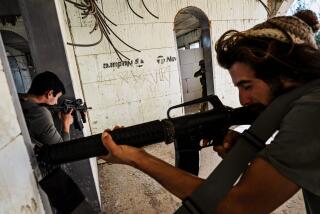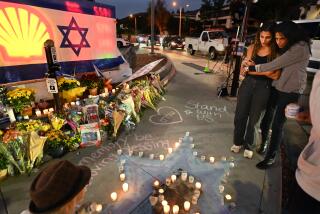Gunman’s Grave Now a Shrine for Extremists
- Share via
KIRYAT ARBA, Israeli-Occupied West Bank — The path to Baruch Goldstein’s grave runs through a peaceful green park with beds of roses and lavender. Graceful wooden pergolas offer shade to visitors.
Up a slight rise and a series of low stone steps lies the elaborate grave of Goldstein, who in 1994 massacred 29 Muslims at prayer in nearby Hebron before he was beaten to death by Palestinian worshipers.
Decorative lamp standards, concrete planters and cabinets for prayer books and memorial candles mark the place for what it is: a pilgrimage site for extremist Israeli supporters of Goldstein, the Brooklyn-born physician who lived and worked in this Jewish settlement in the West Bank.
This week, the Israeli parliament voted overwhelmingly to authorize the army to dismantle the stone plaza, lamps and other accouterments that have helped turn the grave into a shrine to Goldstein and a magnet for those who share his anti-Arab beliefs. The grave itself, including an inscription that lauds the Hebron gunman as a “holy man” who “gave his soul for the people of Israel,” is to remain intact. Israel’s chief rabbis have said moving it would violate Jewish law.
It was not clear how quickly the army will act. But the Defense Ministry said in a statement that the memorial represents an offense to “morals and education” and should be removed.
On Wednesday, a steady trickle of visitors, including Goldstein’s father and several leaders of the outlawed ultra-right Kach movement, paid homage to Goldstein and said they will try to block any attempt by the army to take down the memorial.
Yisrael Goldstein, a tall, lanky man who was paying his second visit of the day to the grave site, insisted that his son should be considered a hero. Echoing unproved accounts offered by radical supporters of the physician, the father claimed that by carrying out the attack, Goldstein had helped prevent a planned Arab massacre of Jews.
“I feel sorry about the innocent people who were killed, but there were people there in the Cave of the Patriarchs who were ready to kill Jews,” said the elder Goldstein, referring to the site of the massacre, which Muslims call the Ibrahim mosque. “It was a preemptive strike.”
He said his family, with the help of contributions, had the memorial constructed after the plans were approved by Israel’s civil administration, which is in charge of Israeli-controlled areas of the West Bank and the Gaza Strip.
The family had wanted to bury Goldstein in the Jewish cemetery in Hebron but were refused permission because the funeral and the grave site were believed likely to provoke violence.
An Israeli military source, who requested anonymity, confirmed that the civil administration had approved the plans for the memorial here, at least in general. “But I don’t think anybody intended for it to turn into a shrine,” he said.
Several of those who stopped to pray at the grave Wednesday declined comment on Goldstein or the new legislation that could lead to the memorial’s demolition. But Bentzion Gubstein, 28, appeared eager to talk.
“I loved the man, and I loved what he did,” said Gubstein, a onetime leader of Kach. “We had a year of quiet after what he did. I look at our situation with the Arabs like a war. He was a soldier in the war.”
But even in Kiryat Arba, a hotbed of radical Jewish settlers for more than 20 years, some say the memorial never should have been established.
“What Goldstein did was stupid,” said Elad Azulai, 17, who was munching cookies with a friend in a cafe near the grave site. “There’s no reason to admire him for it.”
Palestinians and some leftist Israelis, meanwhile, applauded parliament’s action but said they fear that the grave is likely to remain a draw for a small segment of extremists.
“I think Israeli society should ask itself why this is happening, why people support this kind of violence and fascism,” said Ahmad Tibi, an Israeli Arab who is a close advisor to Palestinian Authority President Yasser Arafat.
And Avraham Poraz, a lawmaker for the left-of-center Meretz Party who supported the legislation, said he now wonders whether it might not be better to leave the memorial as it is, as a reminder that such violence--and support for it--exists in Israeli society.
“It’s very important for us to be realistic,” he said, “and to know that we still have among us all these extremists.”
More to Read
Sign up for Essential California
The most important California stories and recommendations in your inbox every morning.
You may occasionally receive promotional content from the Los Angeles Times.













